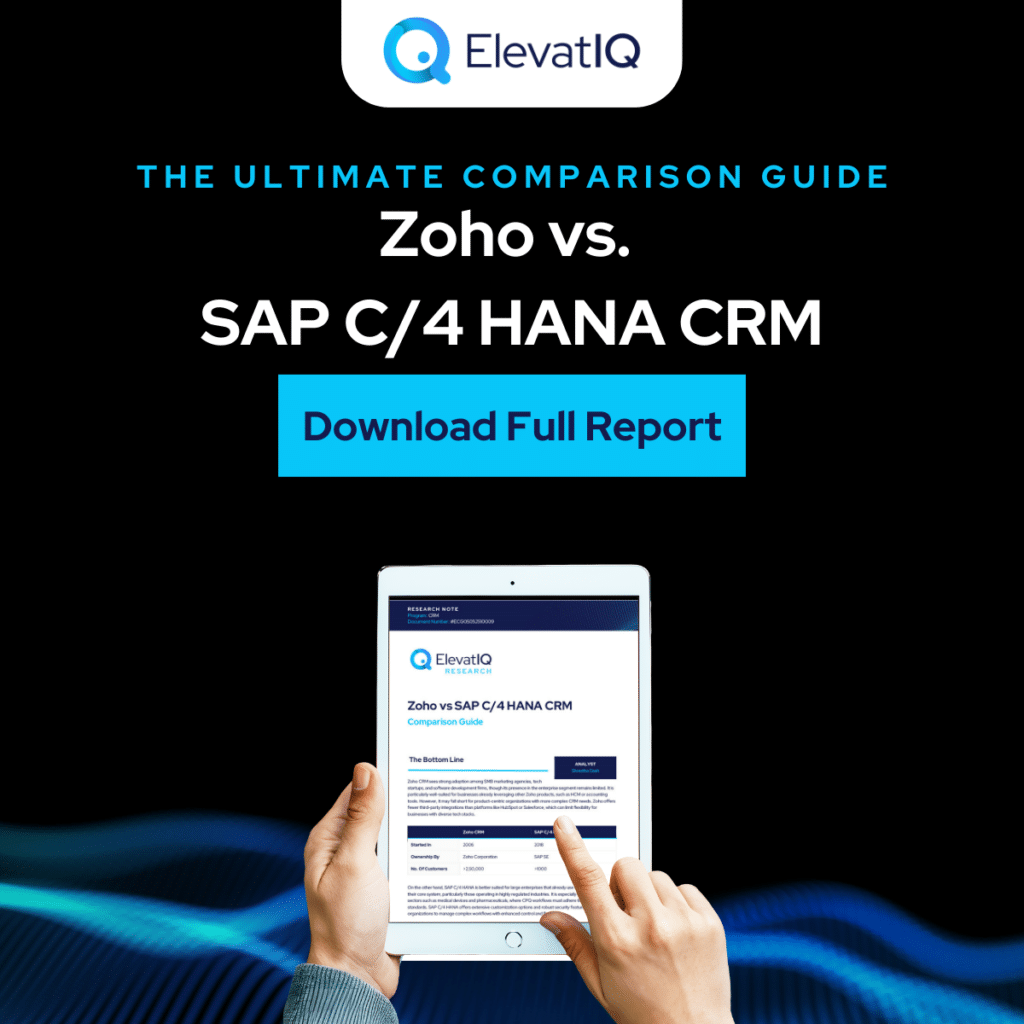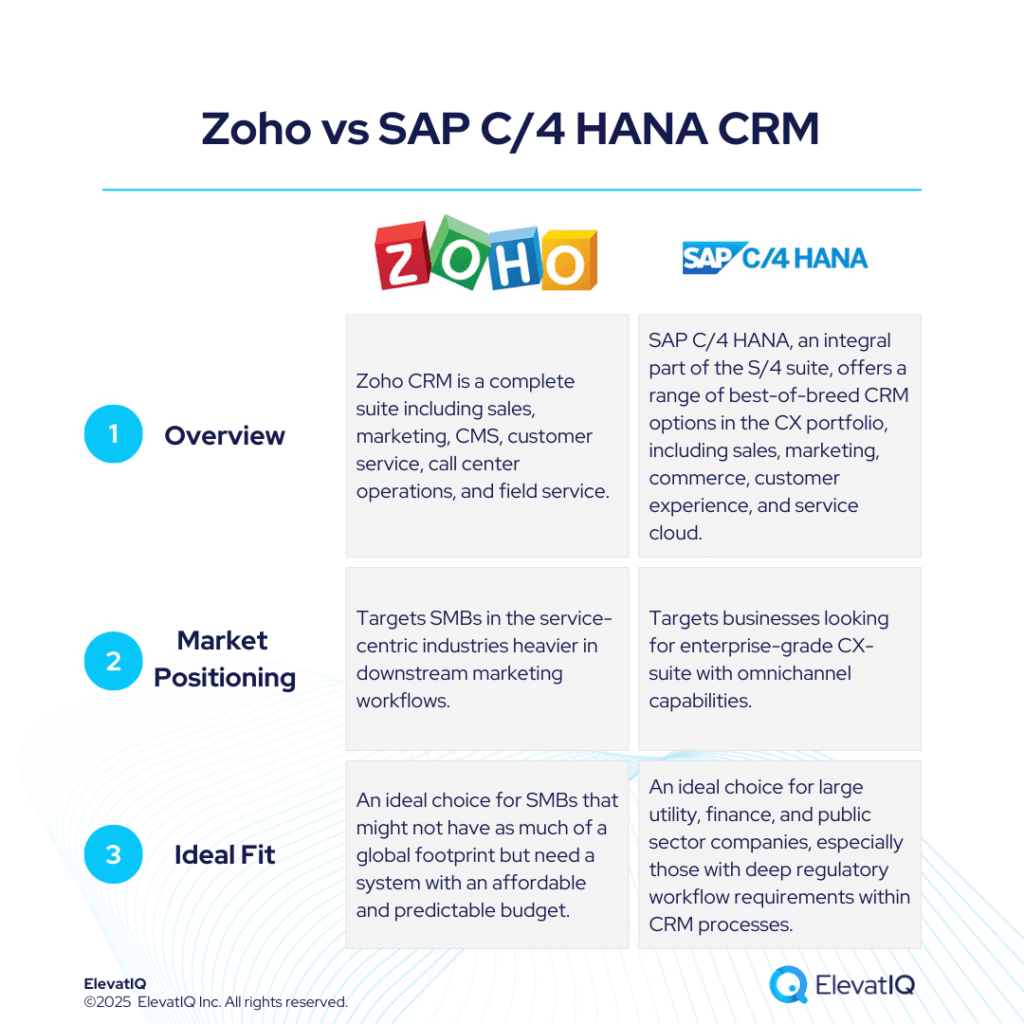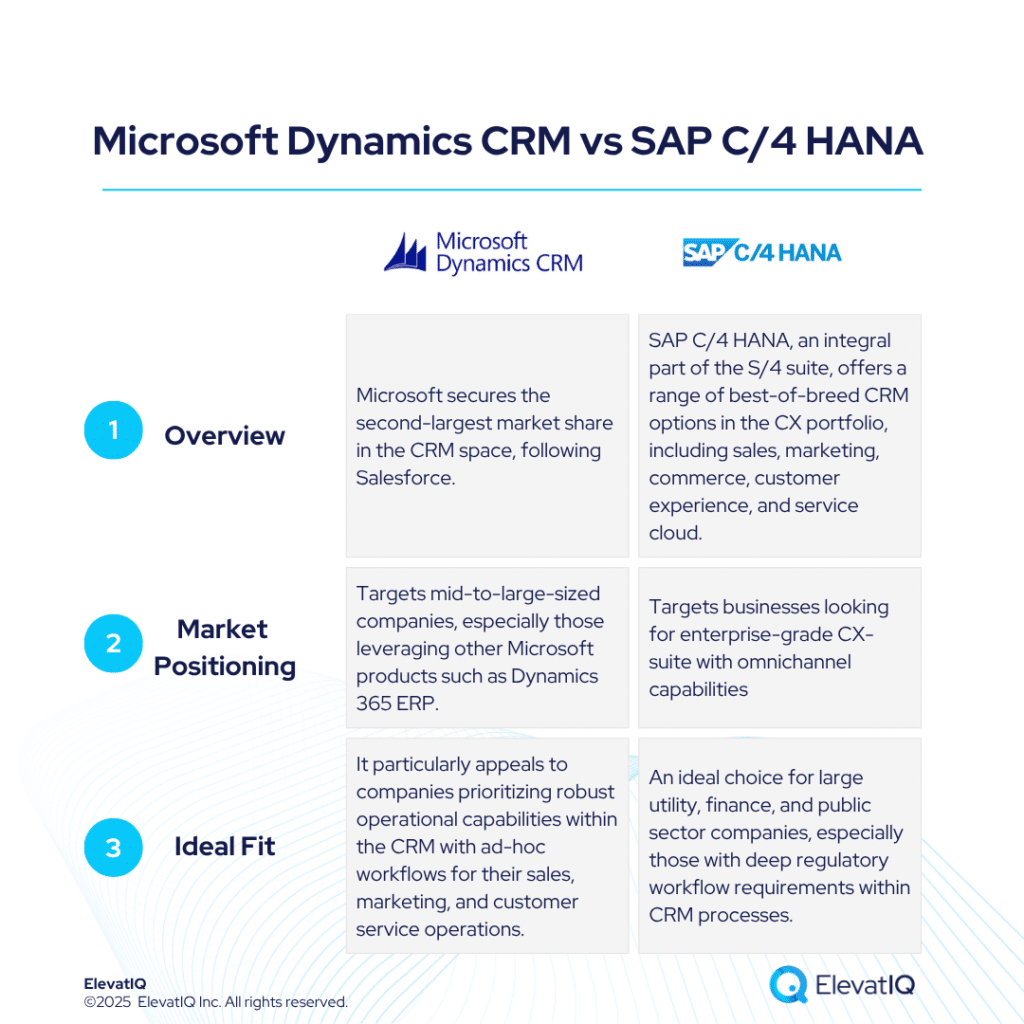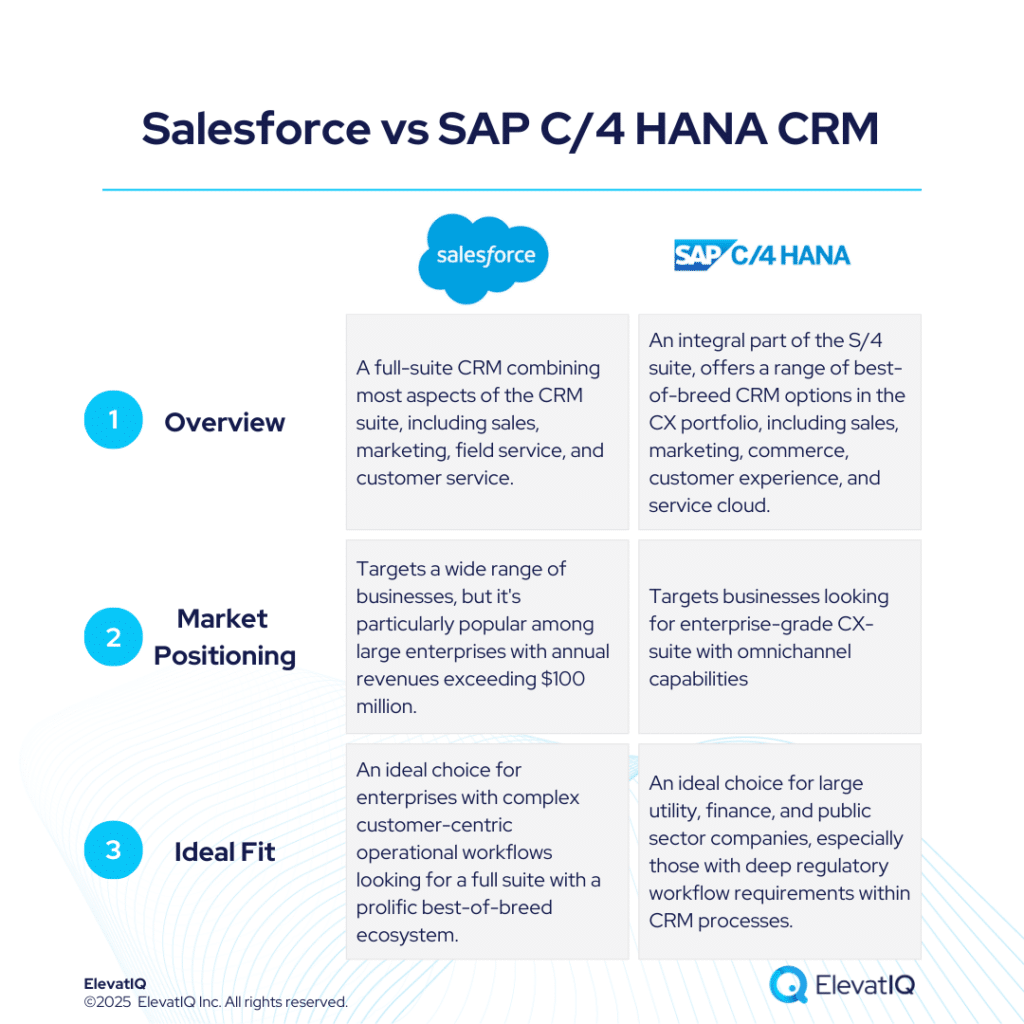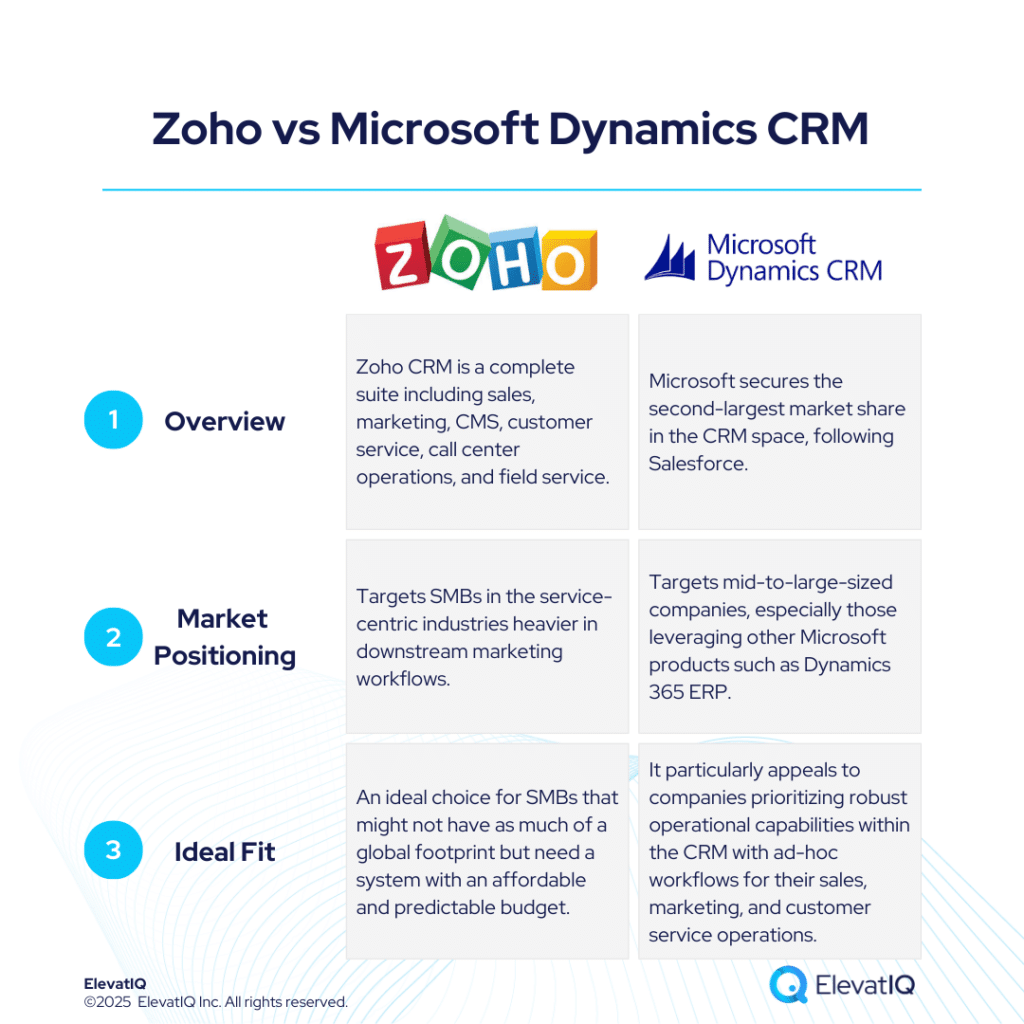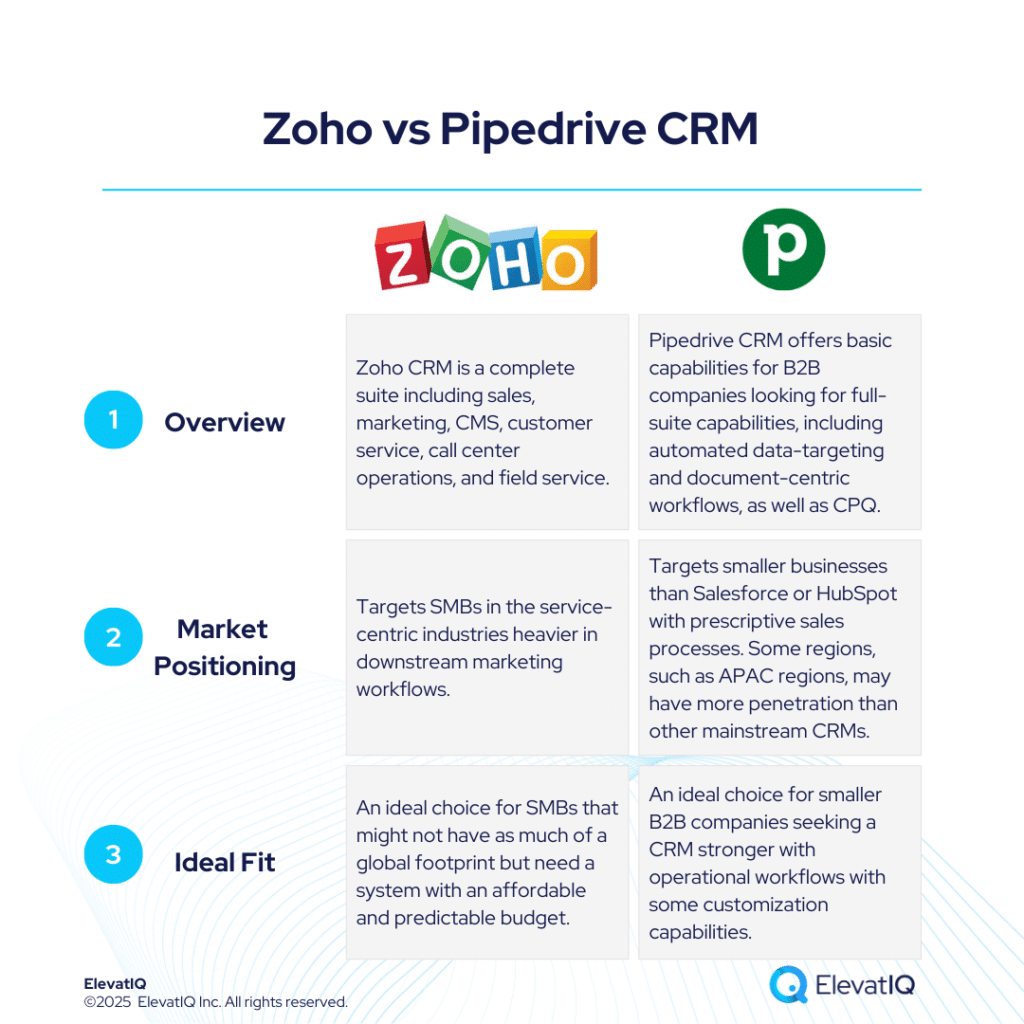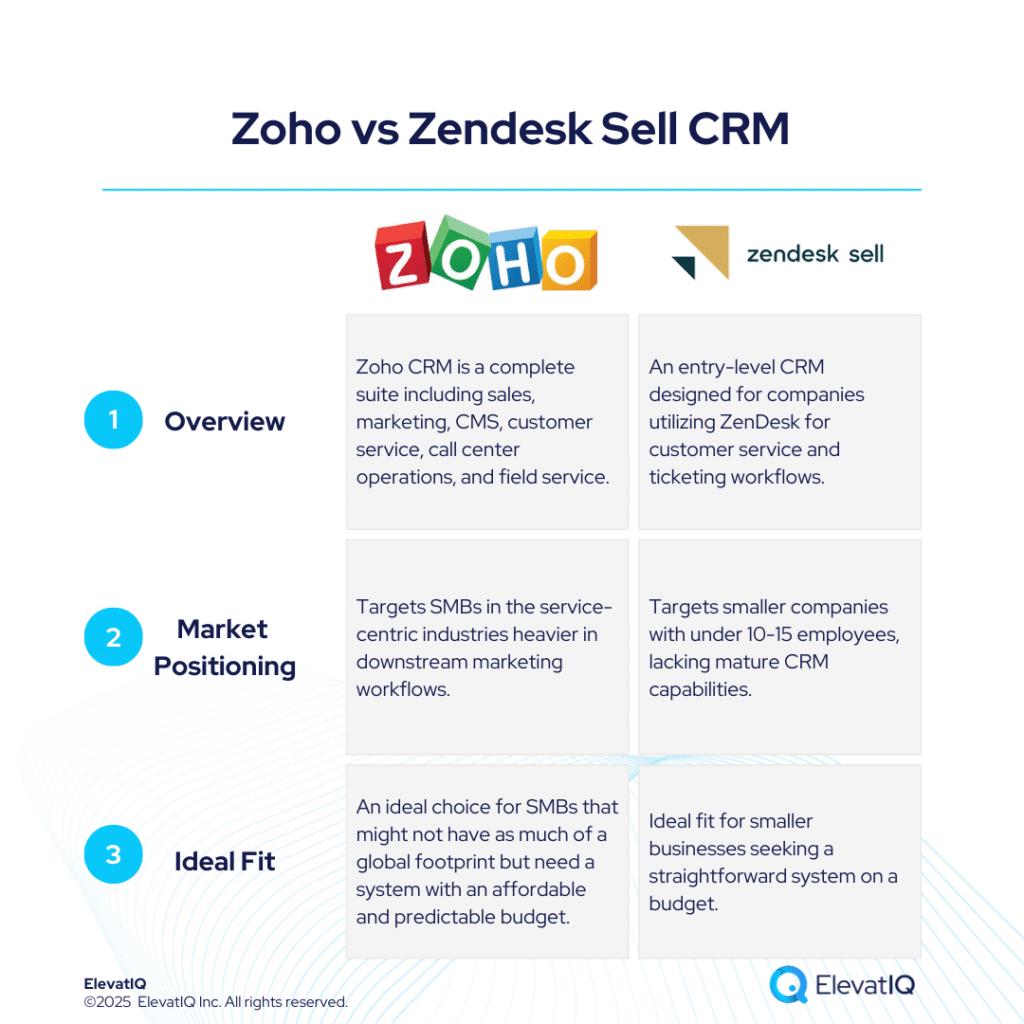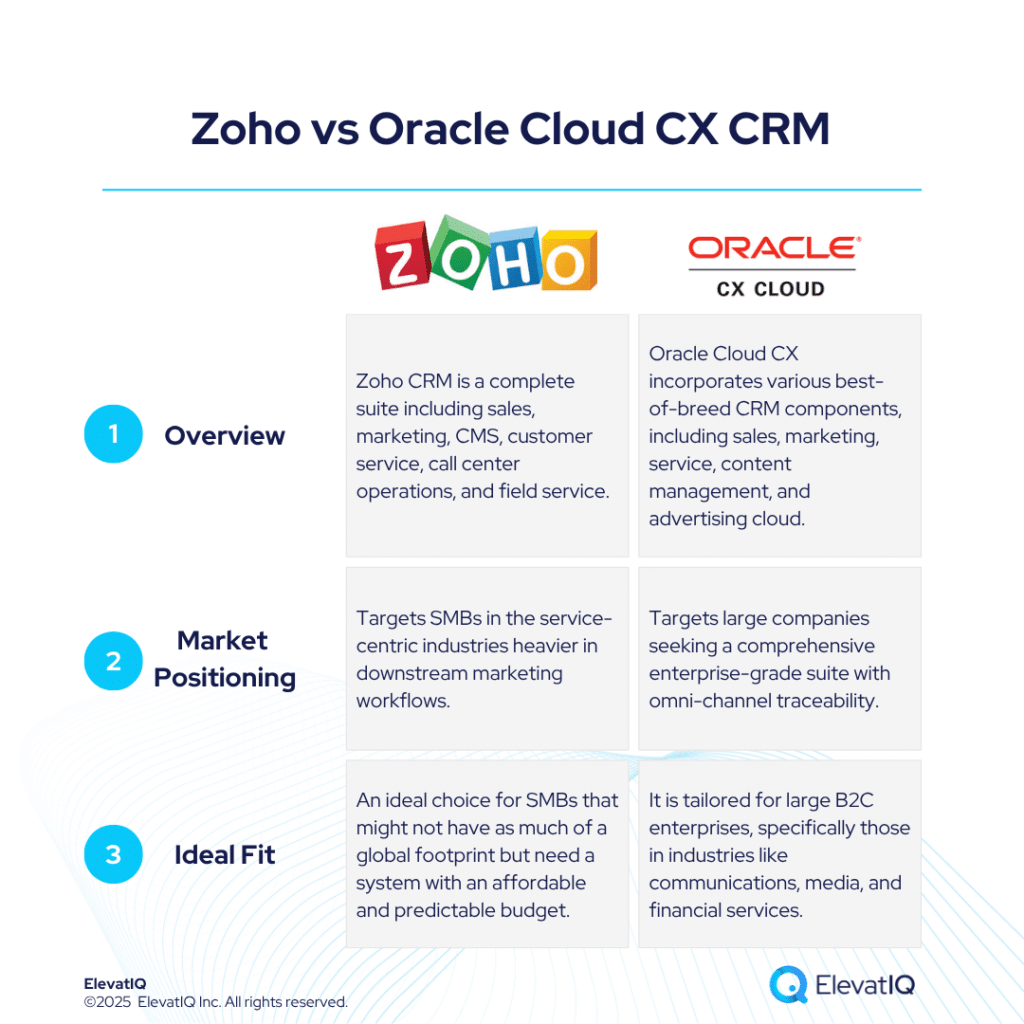Zoho CRM is widely adopted by SMB marketing agencies, tech startups, and software development firms, but its presence in the enterprise sector remains limited. It is particularly beneficial for businesses that already use other Zoho products, such as HCM or accounting tools. Compared to platforms like HubSpot or Salesforce, Zoho offers fewer third-party integrations, which can restrict flexibility for businesses relying on a diverse range of tech tools.
In contrast, SAP C/4 HANA is designed for large enterprises, particularly those already using the S/4HANA suite as their core system, and is especially suited for highly regulated industries. SAP C/4 HANA provides extensive customization options and strong security features, offering enterprises greater control and flexibility to manage complex workflows.
Both Zoho and SAP C/4 HANA deliver suite-centric solutions, though they cater to different markets. Zoho provides an integrated platform encompassing sales, marketing, customer service, and field service, while SAP C/4 HANA offers a comprehensive CRM suite with a focus on commerce and product-centric industries in both B2B and B2C segments. SAP C/4 HANA is bundled within the SAP Customer Experience (CX) portfolio, which includes SAP Hybris, enhancing its digital commerce capabilities.
While Zoho excels with a robust workflow-centric platform, SAP C/4 HANA stands out with its enterprise-grade CDP and advanced identity resolution and management capabilities, crucial for regions with strict data privacy regulations, such as GDPR in Europe. Regarding integration and ecosystem, Zoho operates within a somewhat closed environment, offering limited third-party integrations. In comparison, SAP C/4 HANA’s ecosystem is even more restricted, as it is not widely considered a mainstream CRM platform in the broader market.

What Is Zoho CRM?
Zoho has built a strong position in the CRM market. It offers tailored products for different business segments. The company primarily focuses on SMBs but is slowly expanding into the enterprise space. Zoho provides flexibility through tools like Bigin for small businesses and its flagship CRM for larger organizations. These options support companies at different growth stages. Its broad suite of native applications covers many business functions. These range from sales to IT service management. Zoho delivers this range at a lower cost than many competitors. However, the suite-centric model has downsides. Zoho operates in a more closed ecosystem. It also offers limited third-party integrations. These limits can create challenges for businesses that want best-of-breed tools or highly customized CRM systems.
In comparison, SAP C/4 HANA is designed with large, product-centric enterprises in mind, particularly those already leveraging SAP’s broader ERP suite. Its capabilities in data governance, complex workflow management, and compliance make it ideal for regulated industries like pharmaceuticals and medical devices. But how do the trade-offs stack up? Are you prioritizing speed and simplicity of implementation, or do you need deep customization and regulatory controls? Is your business better served by Zoho’s broad but internally integrated suite, or SAP’s specialized and enterprise-grade stack? Download the ultimate Zoho vs SAP C/4 HANA CRM comparison guide now to explore these critical questions and find the right fit for your organization.
What Is SAP C/4 HANA CRM?
SAP C/4 HANA remains a strong choice for large enterprises. It appeals most to companies already using the SAP ecosystem. These businesses often prioritize compliance, omnichannel identity management, and advanced CPQ features. However, the platform has notable limitations. Its rigid data and process model can restrict flexibility. It also has a limited ecosystem and lacks intuitive marketing tools. As a result, many companies need to add third-party solutions. This increases both complexity and consulting costs. While SAP C/4 HANA is powerful in its specific niche, it has drawbacks. It doesn’t offer the flexibility of an all-in-one CRM. Teams that rely on seamless integrations or mobile-first tools may find it lacking.
In contrast, Zoho offers a more agile and cost-effective platform with user-friendly tools, mobile-ready workflows, and expanding AI functionality. Yet, its limited ecosystem openness and reliance on internally built apps may pose scalability issues for enterprises with diverse tech stacks. So, which trade-offs matter more for your business—enterprise-grade security and compliance, or lower cost and faster time to value? Are you prepared to invest in consulting support for SAP, or does Zoho’s DIY flexibility better match your in-house capabilities? Download the ultimate Zoho vs SAP C/4 HANA CRM comparison guide now to uncover which solution aligns best with your organizational priorities.
Zoho vs SAP C/4 HANA CRM Comparison
Zoho excels in offering a unified suite that’s accessible, cost-effective, and tightly integrated across its ecosystem. This makes it an appealing option for SMBs and growing enterprises that value agility and simplicity. In contrast, SAP C/4 HANA stands out with its deep enterprise-grade capabilities, offering a highly detailed data model and advanced support for CPQ, sales performance, and territory planning—ideal for large industrial firms with complex requirements.
That said, the trade-offs are significant. Zoho’s flexibility and ease of use may come at the cost of deep customization and regulatory readiness, while SAP’s robust architecture and enterprise integrations come with a steeper learning curve and higher total cost of ownership. Does your organization need a platform that emphasizes usability and affordability, or one that supports intricate enterprise workflows—even if it demands consulting support? Are you prepared to adopt SAP’s rigid structure, or does Zoho’s ecosystem provide the right balance of control and convenience? Download the ultimate Zoho vs SAP C/4 HANA CRM comparison guide now to uncover which CRM solution aligns best with your operational and strategic priorities.
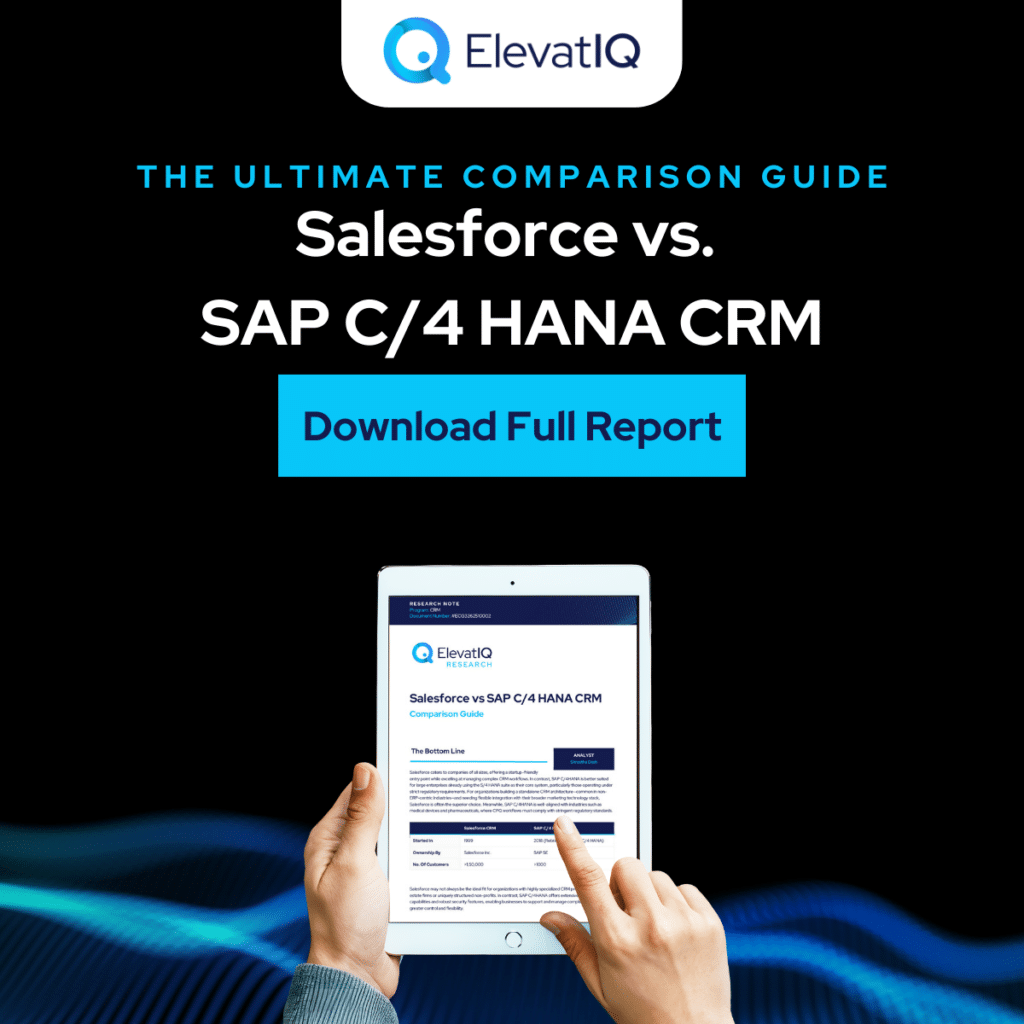
Zoho vs SAP C/4 HANA CRM Module Comparison
Both Zoho and SAP C/4 HANA CRM come equipped with a wide range of features aimed at streamlining business operations and boosting overall efficiency. In this feature-by-feature comparison, we explore the unique strengths and functionalities of each platform across key operational areas. This analysis is designed to help businesses make well-informed decisions when selecting the right CRM solution. Accordingly, the following section evaluates capabilities across four critical modules: marketing, sales, customer service, and e-commerce.
Marketing
When comparing the marketing features of Zoho CRM and SAP C/4 HANA CRM, the differences stand out. Each platform supports marketing teams in its own way. Zoho offers a more user-friendly and integrated toolkit. It includes Zoho Campaigns for email marketing and Zoho Social for managing multiple social media accounts. It also provides apps like Writer and PageSense for content creation and optimization. These tools work well for businesses that want an affordable, do-it-yourself marketing setup. In contrast, SAP C/4 HANA focuses on its Marketing Cloud for email campaigns. However, it lacks built-in tools for content creation, SEO, or social media management. As a result, businesses may need third-party tools to build a complete marketing workflow.
For businesses aiming to centralize their marketing activities within a single ecosystem, does Zoho’s native integration offer more agility and ease of use? Or does SAP’s enterprise-grade email marketing—despite its steeper learning curve—align better with your compliance and scale needs? If you’re weighing depth of features against ecosystem openness and cost, downloading our Ultimate Zoho vs SAP C/4 HANA CRM Comparison Guide can help clarify the decision. Get your copy now to discover which platform best matches your marketing strategy and growth objectives.
Sales
When comparing the sales capabilities of Zoho CRM and SAP C/4 HANA CRM, the contrast between their approaches is quite distinct. Zoho CRM offers a suite of user-friendly tools designed to support end-to-end sales workflows—ranging from lead management and pipeline tracking to email tracking and meeting scheduling. These features are natively built and optimized for sales teams seeking agility and simplicity without the need for extensive configuration. On the other hand, SAP C/4 HANA CRM leans heavily on its broader enterprise ecosystem, with sales functionalities often delivered through integrations with other SAP modules, such as Sales Order Management. While this approach supports robust and scalable sales operations, it may require more effort to set up and use effectively—particularly for companies without dedicated IT or consulting support.
For businesses prioritizing quick implementation and native features, does Zoho’s integrated sales environment offer a more intuitive path forward? Or do the deeply integrated, enterprise-grade components of SAP C/4 HANA better serve complex, compliance-heavy sales environments? To help you decide which CRM aligns with your sales goals, download our Ultimate Zoho vs SAP C/4 HANA Comparison Guide today and gain actionable insights into choosing the best-fit solution for your organization.
Customer Service
When evaluating the customer service capabilities of Zoho CRM and SAP C/4 HANA CRM, it’s clear both platforms provide foundational features to support efficient service operations. Zoho CRM, powered by Zoho Desk and SalesIQ, excels in real-time communication and workflow automation, offering a seamless experience for managing tickets, automating support tasks, and engaging with customers across channels. These tools are particularly attractive to businesses seeking a flexible, cost-effective way to centralize customer interactions. SAP C/4 HANA CRM, on the other hand, delivers a more enterprise-oriented approach through its Service Cloud. With robust tools for ticketing, live chat, and omni-channel engagement, SAP’s strength lies in managing complex service environments with high volumes and strict compliance needs.
So which platform truly aligns with your customer support strategy—Zoho with its agile, all-in-one native tools or SAP C/4 HANA with its enterprise-grade support infrastructure? Does your team need fast, intuitive deployment or a solution built for scalability and integration with broader ERP systems? To find out which CRM solution best fits your service needs, download the Ultimate Zoho vs SAP C/4 HANA Comparison Guide now and make an informed decision backed by detailed insights.
E-commerce
When it comes to e-commerce capabilities, both Zoho CRM and SAP C/4 HANA CRM offer tools designed to support product management and customer-centric experiences, though they cater to different business scales and complexities. Zoho CRM integrates with tools like Zoho Inventory to manage product catalogs, inventory, and order fulfillment—making it a strong contender for small to mid-sized businesses seeking an all-in-one suite. Its flexibility and affordability are attractive, particularly for organizations looking to quickly launch and manage digital commerce without extensive IT resources.
SAP C/4 HANA CRM, however, leans into enterprise-grade e-commerce, offering powerful tools like SAP Commerce Cloud and advanced analytics for deeply personalized customer experiences. These capabilities are ideal for organizations with sophisticated digital storefronts and high-volume order management needs. So, which platform better supports your e-commerce strategy? Do you need the agility and simplicity of Zoho or the scale and depth of SAP? Download the Ultimate Zoho vs SAP C/4 HANA Comparison Guide now to uncover the details that will help you choose the right CRM for your e-commerce operations.
Zoho vs SAP C/4 HANA CRM Pros
When comparing Zoho and SAP C/4 HANA CRM, it becomes clear that each platform excels in different areas depending on business scale and regulatory needs. Zoho CRM provides a powerful low-code environment through tools like Zoho Creator, enabling businesses to customize workflows and build apps without heavy reliance on third-party tools. It also shines in sales compensation and territory planning, making it a good fit for growing companies that prioritize agility, affordability, and native integration within a broader suite of Zoho apps. Meanwhile, its pre-packaged workflow builder allows development-savvy teams to create intricate automation with ease.
SAP C/4 HANA CRM, on the other hand, emphasizes compliance, identity management, and cross-channel personalization. Its deep integration across SAP’s ecosystem stands out, especially for organizations already using other SAP products. If your business requires enterprise-grade CPQ, complex compliance workflows like GDPR or CCPA, or robust data governance across departments, SAP C/4 HANA may be a more aligned choice. But is your organization more in need of agile customization or bulletproof regulatory compliance? Are tight SAP integrations essential, or would broader third-party flexibility serve you better? Download the Ultimate Zoho vs SAP C/4 HANA Comparison Guide now to make the most informed CRM decision.
Zoho vs SAP C/4 HANA CRM Cons
While both Zoho and SAP C/4 HANA CRM offer compelling value, they come with notable limitations that businesses must consider. Zoho CRM, while strong on native app integration, lacks the advanced territory management and sales planning functionalities often required by larger organizations. Its more closed ecosystem can hinder flexibility, especially for companies looking to adopt best-of-breed strategies with third-party tools. Furthermore, Zoho’s customizability—though improving—still trails behind platforms like Salesforce or Microsoft Dynamics when it comes to handling highly complex operational processes or extensive pre-sales planning.
On the other hand, SAP C/4 HANA CRM is built with large enterprises in mind, but its complexity and rigidity can become a hurdle for organizations that need agility and intuitive workflows. The platform often requires heavy consulting support, both during implementation and ongoing customization, which can dramatically increase the total cost of ownership. Is your organization ready to invest in the infrastructure and expertise needed to run SAP C/4 HANA effectively? Or does a leaner, more modular platform like Zoho offer better alignment with your operational goals? Download the Ultimate Zoho vs SAP C/4 HANA Comparison Guide now to dive deeper into these trade-offs and choose the CRM that’s right for your business.
Download the Full Research Report
